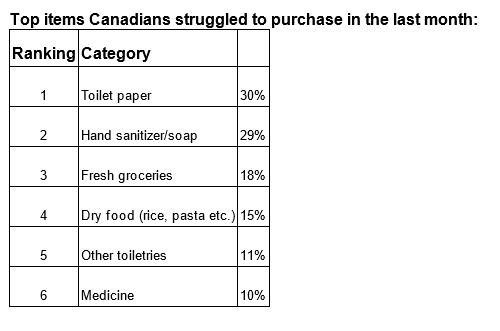A nationwide survey has revealed more than half of Canadian adults have struggled to purchase basic necessities in the wake of COVID-19 panic-buying sweeping the nation.
That’s an estimated 16.3 million Canadians (43 per cent) coming up empty-handed when shopping in the last month.
The Finder.com survey, which tested more than 1,200 adults across the country, was conducted between March 16 and 21.
It revealed, to no surprise, that the biggest shortage was for toilet paper, with nearly one third (30%) struggling to buy some, followed by hand sanitizer and soap (29%), fresh groceries (18%), dry foods (15%), other toiletries (11%) and medicine (10%).
Both men and women are having a hard time buying essentials (54% men vs. 58% women), while 63% of middle aged Canadians (45-54) were unable to purchase the basics for their families in the previous month, the highest rate in any age group.
According to the survey, also troubling was the fact that more than half (52%) of Canada’s elderly, who are at a high risk for complications from the virus, struggled to purchase hand sanitizer, which is crucial in preventing its spread.
The survey also reveals that some parts of the country are experiencing worse shortages than others.
For example, sixty-per-cent of British Columbians say they’ve been unable to purchase essential items, compared to 55% of those in both Ontario and the Prairies, 47% in Quebec and 44% in Atlantic Canada.
How does Canada compare to other countries for hoarding?
Finder ran the same survey in six countries: the United States, Canada, Ireland, South Africa, Hong Kong and the Philippines.
The Philippines recorded the highest number of people unable to buy essential goods (58%), followed closely by the United States and South Africa (56% each). Of the six countries, those living in Hong Kong are least likely to report being unable to buy what they need (43%).
Find the full report, go to Finder.com/ca/coronavirus-pandemic-panic-buying.



